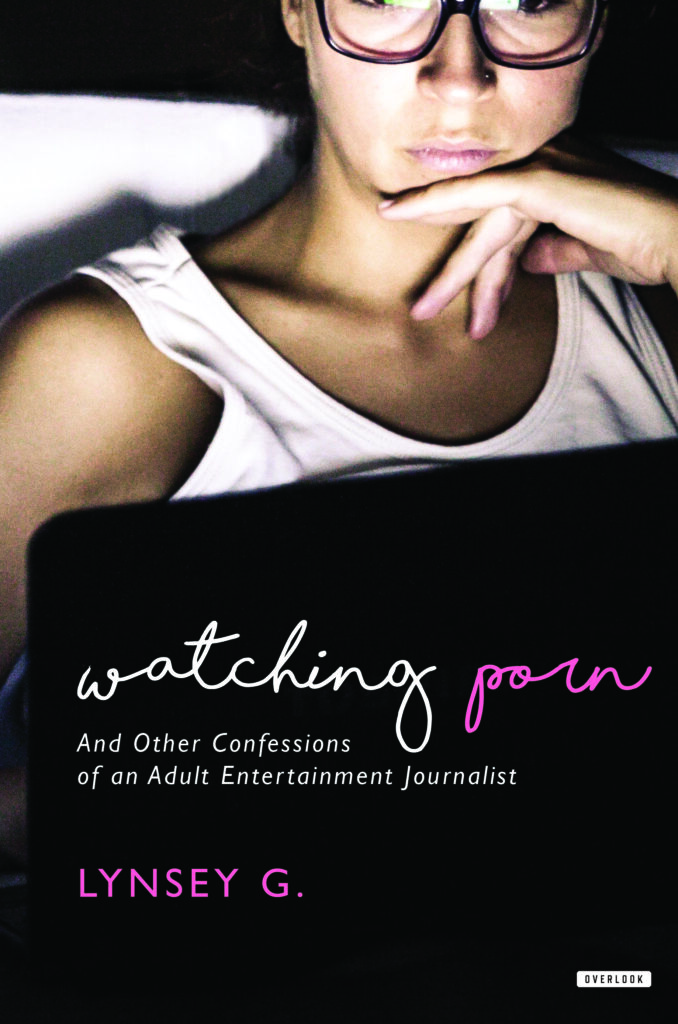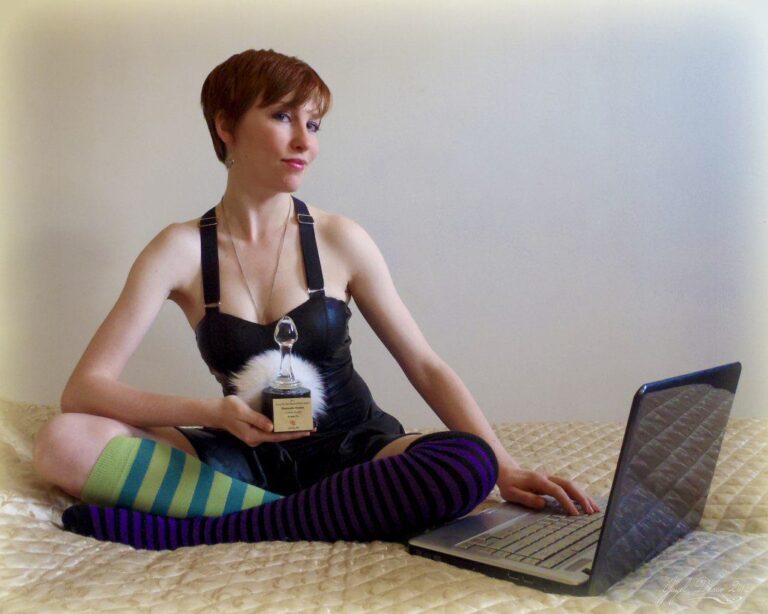We recently spoke to Lynsey G. — writer, editor, and author of the recently released book Watching Porn: And Other Confessions of an Adult Entertainment Journalist.
Lynsey shared some deep-cutting and candid thoughts related to ethics in journalism, as well as ethics in porn journalism specifically. The interplay between wider society and the microcosm of adult entertainment has its own tricky balance, one she is uniquely qualified to discuss.
Enjoy insights from Lynsey below. What do you think?
—
Ethical.porn — Without revealing anything too provocative or choice, what’s your new book about?
Lynsey G. — My book is really an informative text about the contemporary pornography industry in America, cleverly disguised as a memoir. Pornographers and their entire industry are regularly subjected to intense scrutiny and blamed for all manner of societal ills, but it’s rare for the people doing the finger-pointing to actually know very much about the industry they’re so upset about. And it feels like most consumers don’t spend a lot of time thinking critically about porn as an industry — how the stuff they’re watching gets made, who the people who make it really are, how they get paid, and so on.
I’m by no means an expert on all things pornographic, but since I’ve worked around the industry for the past decade, I’ve seen and learned a lot about how this all works from a sort of half-inside, half-outside perspective. I decided to try to educate readers about the industry by giving them a look through my eyes at the experiences I’ve had and the knowledge I’ve taken away from them, making it personal and hopefully a tad entertaining, but also informing them about how the entertainment they enjoy came to be.
[A] lot of the people who work in porn are braver than I am: they’ve gone into a line of work that has earned most of them disapproval from the larger culture, and sometimes castigation from their friends and families, too. — Lynsey G.
Is there anything specific about our contemporary environment that encouraged you to write a book? Put simply, why now?
Porn has become nearly ubiquitous in the new millennium. Basically anyone with an internet connection can access video pornography on the internet for free — and make their own porn, upload to the internet, and become a pornographer, if they want to. It’s a fact that makes a lot of us really uncomfortable, so we often don’t talk about it, or we just crack jokes about it, or we get mad about it and make all sorts of silly assumptions and accusations about how porn is a “public health crisis” (I’m looking at you, GOP).
But it doesn’t really matter if it makes us uncomfortable. It’s everywhere, and that’s the reality we live in now: Porn is easy to access, and there’s lots of it, and most of us look at it on the regular. The sexy media we watch informs our ideas about what sex and sexuality look like, and how they function, so it’s vital that we’re able to look at our relationship to it in an informed light. This book is kind of an invitation to learn more about pornography and to think more critically about it and its role in our lives — and hopefully be entertained along the way.
Can you describe any ethical issues you’ve came up against as a journalist working in the adult space?
Well, there have been many. But when it comes down to it, for the most part, the issues that I’ve faced have all revolved around issues of consent. Whether that means watching a film or scene in which the performers’ consent seemed questionable, investigating the complicated interplay of consent and boundary-pushing that goes on in a lot of pornography, figuring out my own feelings about consenting to being involved in all of this in the first place (early in my career), or seeing images and video being pirated or taken out of context without their creators’ consent.
The entire porn industry revolves on consent. When that’s called into question or violated, everything spirals out of control — which, in a nutshell, is a lot of what’s happened to the porn industry in the Internet age. The stealing and reposting of producers’ and performers’ hard work, often presented with demeaning tags and really gross categorization, all happens without the consent of the people who made that entertainment. And it’s struck a huge blow to the industry. Really, when all is said and done, the most ethical thing that porn consumers can do is pay for the content they want to see. That contributes to the porn economy and enables more people to make consensually filmed, professional material that everybody can enjoy, and everybody wins!
The entire porn industry revolves on consent. When that’s called into question or violated, everything spirals out of control. — Lynsey G.

As a journalist working in a stigmatized space and frequently exploited or misrepresented community, often presenting the porn world to the civilian/mainstream world, are your occupational ethics ever at odds with your personal connection to the community?
That’s a really good question. It’s taken me a long time to start thinking of myself as an actual journalist. I have very little training in journalism, and it was never something I set out to do. It sort of evolved that way on its own. As such, I really felt my way along for most of my career, and especially in the beginning when there was virtually no “porn journalism” being done — at least that I knew of — and I didn’t know what I was doing or what was expected of me, I was more willing to toe the line in certain circumstances. For instance, I got started as a DVD reviewer for an adult magazine, and was told right off the bat that I couldn’t give any movie a bad review, because that would hurt the magazine’s relationship with companies they got their screeners from. Reviewing porn films isn’t exactly hardcore journalism, but that’s the information I was more or less working with when I started down this path: we scratch your back, you scratch ours.
So I climbed quite a ladder from where I started to where I am now when it comes to honesty, transparency, and so on. But I’ve definitely picked up some favorites, some friends, and a few foes along the way, and it would be silly for me to pretend that I don’t grapple with that reality when I write. Porn is a politically fraught topic from within and from without, and I’ll absolutely admit that I have a huge soft spot for the industry. Honestly, a lot of the people who work in porn are braver than I am: they’ve gone into a line of work that has earned most of them disapproval from the larger culture, and sometimes castigation from their friends and families, too.
I may be overly apologetic for some of the bad things that can and do happen within the industry because I’m so sympathetic to it. But I do my best to be transparent where I can (obviously sometimes I have to protect my sources), and to maintain integrity. I really want people to think, read, and talk about porn more, and me playing favorites isn’t going to help anyone get closer to that goal.
—
Lynsey G. is a writer, editor, and author of ‘Watching Porn: And Other Confessions of an Adult Entertainment Journalist.’ Get you copy on Amazon here. Find Lynsey on Twitter at @MissLagsalot.
Author image credit — Jayel Draco



Comments are closed.